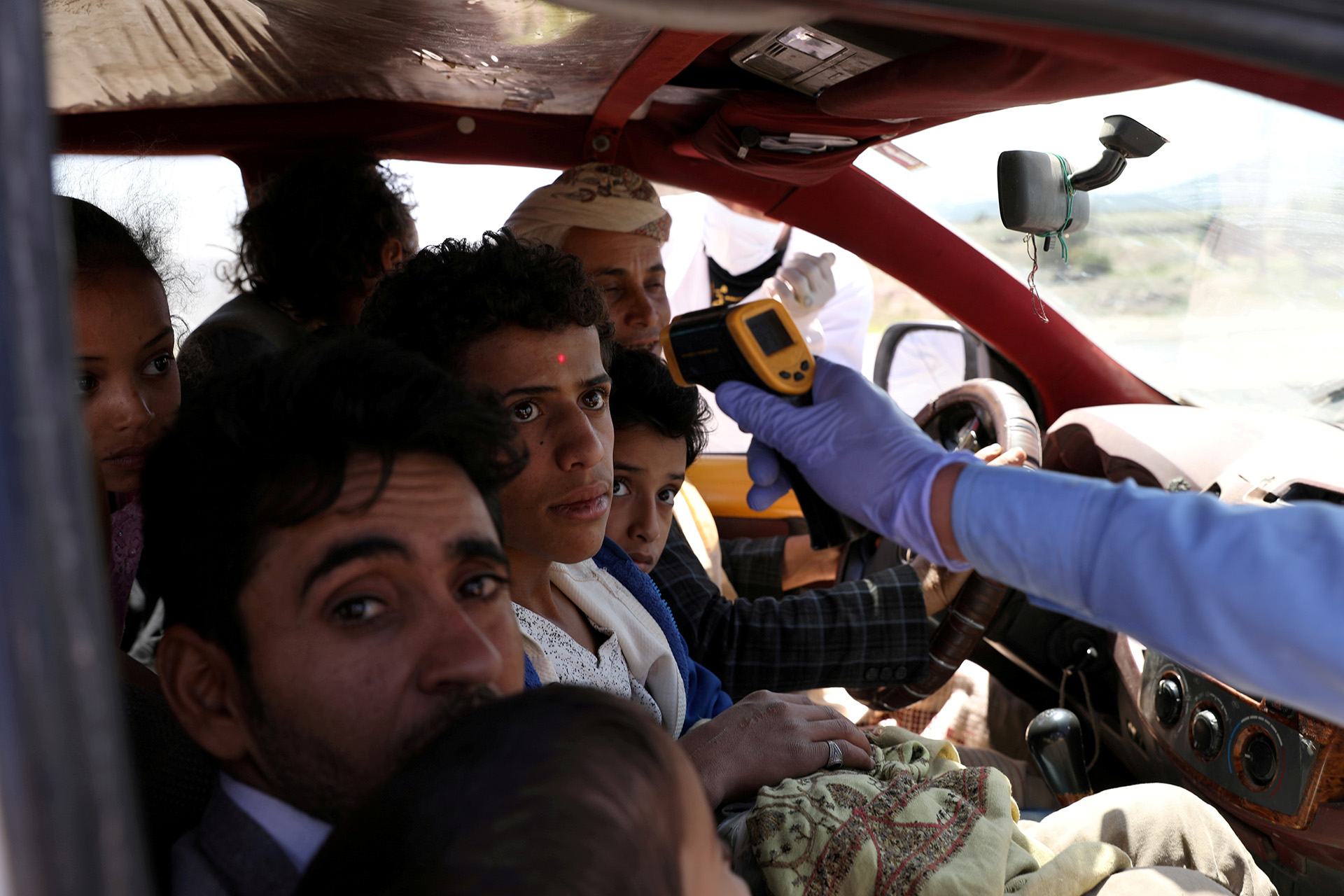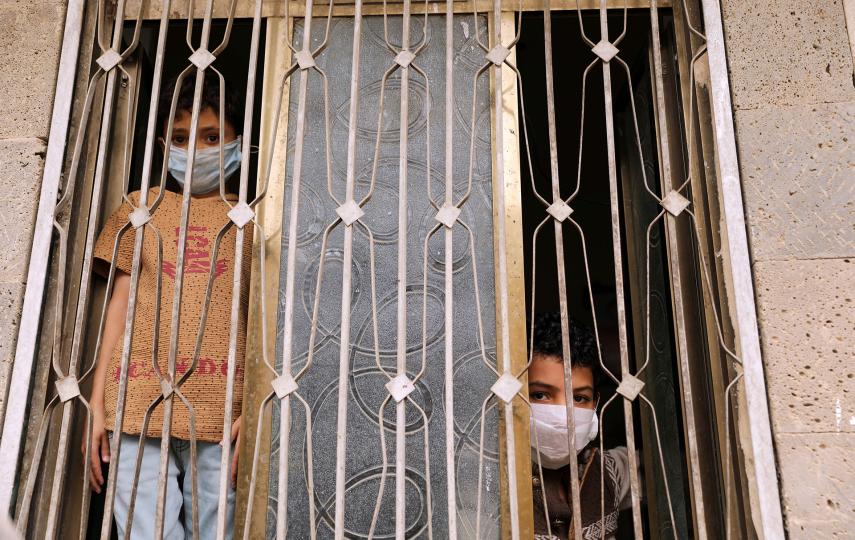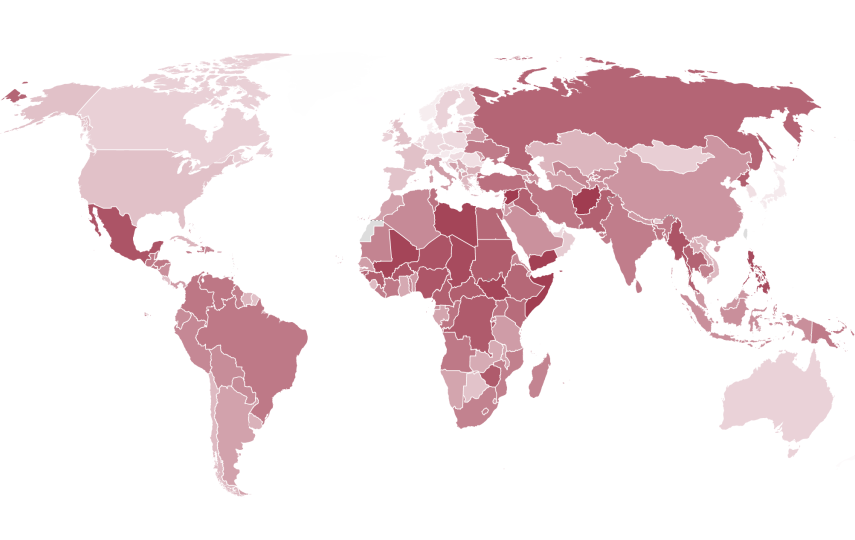Our editors’ weekly take on humanitarian news, trends, and developments from around the globe.
You can now sign up to receive The Cheat Sheet as a newsletter. Subscribe here.
On our radar
Coronavirus concern in Yemen
With testing numbers low and the health system ravaged by five years of war, nobody really knows how many people are infected or dying of COVID-19 in Yemen, but the outlook does not look good. Hundreds of people in Aden have reportedly died with symptoms that appear consistent with the coronavirus, and in the Houthi-controlled north there are unconfirmed but persistent rumours of a cover-up to mask a rising case count. To make matters worse, the UN – concerned it can’t protect its staff from the virus inside their compound – has pulled half of its remaining international workforce out of Sana’a, putting them on flights to Addis Ababa. Some people have remained behind in the Yemeni capital, and others are holed up in Aden (recently deluged by flash floods and a power struggle), but most expatriates who work for UN agencies will now have to do their jobs remotely. The bulk of the UN’s aid workers in Yemen are Yemenis, of course, and they are still in the country, doing their best to fight off a global pandemic that even the world’s richest countries are struggling to manage.
Grim outlook in Latin America
Two months after many countries in the region shut their borders, COVID-19 is still rampant in Latin America, and slum-dwellers, women and girls, people of African descent, and indigenous groups are hardest hit, PAHO chief Carissa Etienne said. As inequalities are magnified by the lockdowns, the International Labour Organisation and the UN’s Economic Commission for Latin America reported that the pandemic is expected to drive unemployment in the region up 3.4 percent to 11.5 percent – poverty would then be predicted to affect 34.7 percent of the population, with extreme poverty affecting 13 percent, or 83.4 million people. Brazil, where a second health minister exited in less than one month over disagreements with virus-denying President Jair Bolsonaro, is soon to be second globally in terms of confirmed COVID-19 cases. In neighbouring Peru, 80 percent of intensive care beds in the capital, Lima – where a third of the population lives – are taken by coronavirus patients, while at least 200,000 out of work people in coastal cities want to return to their hometowns. Indigenous peoples in eight Amazon Basin countries have, meanwhile, appealed to the UN for help. And, frustrated with the growing spread from imported cases, Guatemalan President Alejandro Giammattei blasted US counterpart Donald Trump for deporting infected migrants and asylum seekers.
Aid groups plan for a ‘new normal’ in disaster response
Half-filled storm shelters; volunteers armed with protective equipment; pre-positioned stocks for millions. Is this the new normal for communities in the world’s most dangerous cyclone corridors? Cyclone Amphan barrelled into parts of coastal India and Bangladesh on 20 May. Mass evacuations saved countless lives, though dozens of deaths have been reported and early assessments have found extensive damage. The coronavirus pandemic is forcing aid responders and governments to rethink responses, given that evacuations typically involve crowded shelters. Recent storms in the Philippines and the Pacific Islands – Typhoon Vongfong and Cyclone Harold – also provide a path forward. SEEDS India warns that frontline responders will need personal protective equipment, or PPE. In the Philippines, the evacuation of some 180,000 people was slowed by coronavirus lockdown measures that kept centres only half-filled. Vanuatu relaxed social distancing measures briefly; Fiji enforced occupancy limits on shelters and planned to “weatherproof” the country’s COVID-19 containment. Aid groups in the Philippines are reviewing what worked (or didn’t) to update disaster and conflict contingency plans – exploring what future disasters will look like under a “new normal”.
Data you can count on
“Anticipatory and forecast-based” humanitarian funding, championed by the German government, the Red Cross Movement, and the UN is the financial equivalent of the proverb “a stitch in time saves nine”. If, say, floods can be predicted, then money can be unlocked so that people can get out of harm's way and save their stuff. That’s cheaper and saves lives. For this to work, though, donors need to believe the data. In practice, the signals are a mix of hard numbers (the depth of the river upstream) and expert analysis. Forecasting floods is straightforward compared to famine. In a series of studies, food security specialists based at Tufts University found that the state-of-the-art IPC system used to predict famine in Yemen, South Sudan, and elsewhere is flawed. Findings presented as data-driven are shaped by political or institutional agendas. In Ethiopia, where the government tends to minimise bad news, their latest report said analysts were keeping a second “set of books” with more realistic figures. The World Bank intends to apply AI to the problem of famine, but what will it feed the algorithm?
Hundreds die in South Sudan clashes
At least 280 civilians have been killed in inter-communal clashes in eastern Jonglei state. Among the dead were three humanitarian workers. The violence began on Saturday, when members of the Murle ethnic group attacked the town of Pieri and ethnic Lou Nuer villages in Uror county. A Médecins Sans Frontières staff member was killed in Pieri, along with two aid workers from a local NGO. The violence continued into Sunday, with homes torched and looted. Tit-for-tat inter-communal killings have been underway for months. David Shearer, the head of the UN peacekeeping mission, said some of the violence is due to the power vacuum created by the failure of the new coalition government to appoint governors to the country’s 10 states, including Jonglei. He added the killings were also fuelled by “economic deprivation” as a result of last year’s floods, which “killed thousands of cattle which families rely on for their survival”. The flooding has left some households in Jonglei’s Akobo and Duk counties facing “catastrophe” levels of hunger. Rains are again falling, and aid agencies are racing to pre-position food and medicine.
In case you missed it
AFGHANISTAN: The country’s two rival presidents inked a power-sharing agreement this week that will see challenger Abdullah Abdullah relinquish his claims after September’s disputed elections. He will reportedly oversee stalled Taliban peace talks. The news comes as Afghanistan faces growing impacts from the coronavirus pandemic, as well as escalating violence – including last week’s unclaimed attack on a Kabul maternity ward.
MEDITERRANEAN: Families of Eritrean migrants who died in an alleged pushback in April orchestrated by Malta’s armed forces are suing the Maltese government. Malta is accused of using private vessels to illegally intercept migrant boats and take them back to Libya. For more, read our briefing on the EU’s delayed migration and asylum pact.
MYANMAR: The military’s nationwide ceasefire, announced earlier this month, has a rather large caveat: it doesn’t cover the country’s most heated conflict with the Arakan Army in parts of Rakhine and Chin states. The International Crisis Group called the move “more of a political gesture than a meaningful attempt to halt conflict”, given that fighting elsewhere in the country has been relatively limited in recent weeks.
OXFAM: COVID-19, on the heels of 2018’s sex abuse revelations, has pushed the NGO alliance into sweeping cutbacks, which will affect 700 local partner organisations. Oxfam will lay off 1,450 staff and pull out of 18 countries.
SYRIA: Syrians are feeling the economic impact of COVID-19, as the country’s currency falls and food prices rise, a serious concern that UN relief chief Mark Lowcock noted in a briefing this week to the Security Council. The World Food Programme now says that 9.3 million Syrians are classified as “food insecure”, up from 7.9 million six months ago.
UNITED STATES: On 18 May, the Trump administration extended indefinitely a directive that effectively seals off the US border from all migrants and asylum seekers. More than 20,000 people have been expelled from the southern US border since the order was first implemented in late March, due to the coronavirus pandemic.
Weekend read
Five years after a bloody crackdown, a new vote stirs violence in Burundi
While Burundi’s ruling party tried to pass off Wednesday’s general elections as credible, opposition members accused the authorities of electoral fraud amid growing fears the East African nation is heading towards a new political crisis. Social media was blocked as polls opened, while the Burundi Human Rights Initiative said several opposition supporters had been arrested and that ruling party members had been spotted voting multiple times. The lack of transparency around the vote is emblematic of a government that has consistently swept abuses under the rug since President Pierre Nkurunziza won a disputed third term in office in 2015. It’s also one among many reasons that opposition leader Agathon Rwasa retains so much support across the country. Nkurunziza preferred not to stand this time – he is set to become a “supreme guide” instead – but he will cast a long shadow over his successor, expected to be ruling party candidate Evariste Ndayishimiye, who fought as a rebel commander alongside the president during the 1993-2005 civil war. In our Weekend Read, we look at what’s at stake in the contested vote and unpick the fallout of a five-year crisis that has hollowed out Burundian civil society, crippled the economy, and sent hundreds of thousands fleeing to neighbouring countries.
And finally…
Eid Mubarak!
This weekend’s Eid al-Fitr, the holiday that marks the end of the Muslim holy month of Ramadan, will look and feel different for those celebrating around the world, thanks to the COVID-19 pandemic that has already altered so many aspects of life. While traditions vary, the three days are usually spent in communal prayer, feasting with family and friends, strolling through outdoor festivals, gift giving, and, in Afghanistan, with a hard-boiled egg fight. This year, after some countries saw a rise in coronavirus cases during Ramadan, many places – Jordan, Saudi Arabia, Turkey, Indonesia, and the West Bank, to name just a few – have put in place special rules to prevent further spread, shuttering mosques and forbidding the usual festive gatherings. Much as last month Jews participated in virtual Passover seders, and Christians took to their computers and phones for Easter, so this holiday will likely see some Muslims praying and enjoying each other’s company via Zoom. Eid al-Fitr will certainly feel different, with infections and deaths rising and so many unknowns in majority Muslim countries like Yemen, Syria, Egypt, and Bangladesh’s Rohingya camps, where the virus officially arrived last week. Here’s a look back to last year, when the world looked very different, but neighbours in one part of north Lebanon – where people live in poverty and many have fled violence – still managed to enjoy Ramadan together.
as-il-bp-kp-pk-oa/ag





